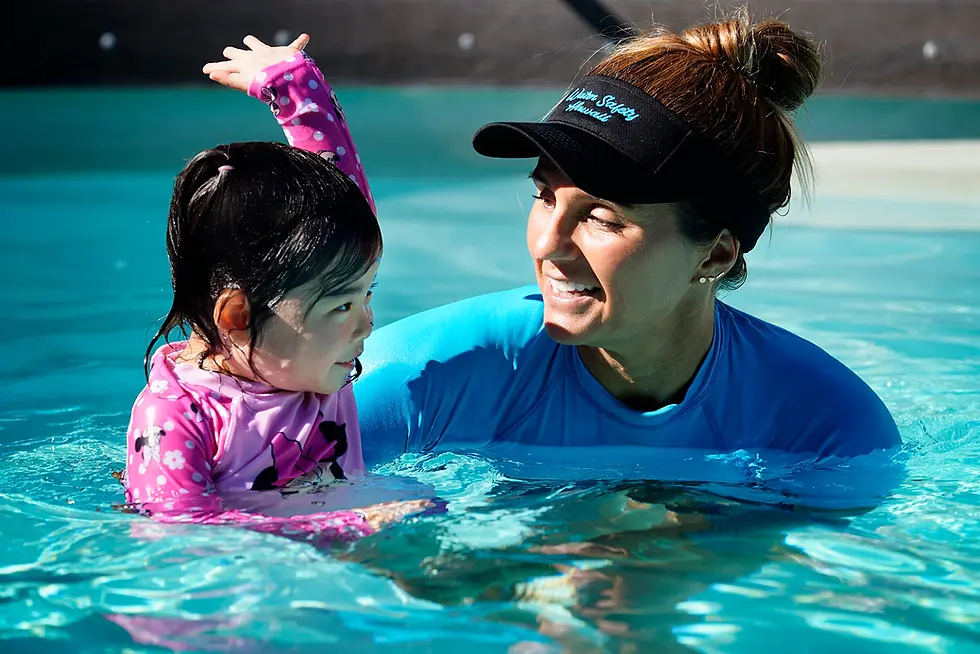Unlocking the Door to Advanced Aquatic Opportunities with Infant Swimming Resource (ISR) Survival Swim Lessons!
- aharrer36
- Mar 3, 2025
- 5 min read
By Water Safety Advocate, Aquatic Behavioral Specialist, Water Polo Coach Audrey Harrer

When it comes to the safety and well-being of our children, especially in and around water, nothing is more crucial than proper water safety education and a solid base in high quality survival swim lessons . The earlier children learn how to float independently and swim, the more confident and safe they become in aquatic environments. Infant Swimming Resource (ISR) is a unique survival swim program that focuses on teaching infants (6 months old) and young children (6+ years old) essential water safety skills. ISR not only prioritizes safety but also sets the foundation for more advanced aquatic opportunities as your child grows and excels in the water .
In this blog, we’ll explore how ISR survival swim lessons provide the essential aquatic life-saving skills that can lead to greater confidence in the water and open the door to advanced aquatic opportunities.
What is Infant Swimming Resource (ISR)?
Infant Swimming Resource (ISR) is a globally recognized swim program designed for infants and young children, starting as young as 6 months old, that focuses on self-rescue techniques and aquatic problem solving. The program teaches infants that are not yet walking how to independently roll onto their backs to float, rest and breathe. Children that are over 12 months and that are fully walking will learn the Swim Float Swim Sequence. This involves searching for and exit while swimming for about 3-4 seconds, rolling back to float for 4 seconds then flipping over to swim again. These Certified ISR Instructors are highly trained in child development, sensorimotor learning, child psychology and behavioral sciences. The ISR curriculum emphasizes water safety in emergency situations, ensuring that children are prepared to handle unexpected situations in the water, such as falling in alone.
What makes ISR unique is its holistic approach. It focuses not only on teaching babies how to swim and float independently but also on ensuring they have the aquatic problem solving skills necessary for self-rescue, which can be life-saving if your child is ever found unsupervised in or around water. Through personalized, one-on-one instruction, children develop the strength, coordination, and confidence to stay safe in the water.
The Link Between ISR and Advanced Aquatic Programs
While ISR survival swim lessons are an essential starting point for water safety, they also pave the way for more advanced aquatic programs as children get older. Learning survival skills lays the foundation for various aquatic opportunities that promote both recreational enjoyment and competitive excellence. Here’s how ISR opens the door to future aquatic opportunities:
Water Confidence: One of the most valuable outcomes of ISR lessons is building competence then confidence in the water. Once a child has mastered basic survival techniques, they can enjoy and engage with more advanced aquatic activities without anxiety or hesitation. This confidence is key when transitioning to activities like stroke swimming lessons or recreational water sports.
Foundational Life Skills: ISR focuses on teaching key aquatic skills, such as breath control, floating, and advanced movement (swimming, turning & rotating) in the water. These fundamental skills are the building blocks for further development in more advanced swimming and aquatic activities, providing your child with an excellent foundation for future learning.
Survival or Self-Rescue Mentality: The self-rescue skills children gain in ISR lessons — such as floating on their back and swimming to safety — can become second nature as they grow. These survival skills are essential for any future aquatic activity, ensuring that safety remains a priority even as children explore more complex forms of swimming and water sports. I always say "Water Safe First" is our number one priority. Then advanced skills after.
Advanced Aquatic Opportunities Following ISR Lessons
Once a child has completed their ISR survival swim lessons, they can progress to a variety of advanced aquatic programs. These opportunities build on the safety, confidence, and skills gained during ISR training. Here are some advanced programs that children can explore after mastering survival swim:
1. Stroke Swim Programs & Transition to Stoke
After completing ISR, many children transition to more advanced swim programs that teach additional techniques, strokes, and endurance. Programs such as Transition to Stroke courses focus on refining swimming techniques, including the freestylel, backstroke, breaststroke and butterfly. These lessons are essential for children who want to strengthen their swimming skills and improve their efficiency in the water.
2. Competitive Swimming or Club Swim Team
For children who develop a passion for swimming, competitive swimming offers the opportunity to take their skills to the next level. Programs like USA Swimming or Club Swim Teams allow children to participate in swim meets, focus on stroke improvement, and develop competitive skills. With the foundational swimming techniques gained from ISR, children are better prepared to dive into more intense swim training and competition.
3. Water Polo
If your child is interested in team sports and enjoys swimming, water polo can be an exciting option. This sport combines swimming skills with teamwork, strategy, and ball-handling skills. After mastering survival swimming, children can transition to stroke, learn to tread water and start participating in Learn to Play water polo programs. Here they will further develop their swimming speed, agility, treading water (eggbeater), passing, shooting and other coordination in the water.
4. Junior Lifeguard Programs
For children who love the water and want to explore a more structured aquatic role, Junior Lifeguard Programs offer a fun and educational way to learn the fundamentals of lifeguarding. These programs teach water safety, CPR, rescue techniques, and physical fitness, preparing older children for potential future careers in aquatics.
5. Diving
Diving is another advanced aquatic sport that children can pursue once they are comfortable in the water. Junior Diving Programs teach the basics of diving techniques, form, and safety practices. The water confidence gained through ISR lessons makes diving a natural next step for children looking for a new challenge in the pool.
6. Surfing and Bodyboarding
For children who enjoy open-water activities, learning how to surf or bodyboard is a great progression. This is something I've seen children first hand fall in love with. Having a strong swimming background is essential for all ocean sports, especially surfing & bodyboarding. After gaining water confidence and basic swimming skills from ISR, children can begin to explore these fun and adventurous water sports in the ocean with the help of adults.
Conclusion
Infant Swimming Resource (ISR) survival swim lessons are an essential stepping stone in your child's aquatic journey, laying the foundation for water safety, confidence, and self-rescue skills. These lessons equip children with the critical skills they need to be safe in the water, but they also open the door to a wide range of advanced aquatic opportunities.
From competitive swimming, water polo to diving and surfing, the skills gained through ISR prepare children for more complex and enjoyable aquatic activities. As children continue to grow and their aquatic skills develop, the world of water sports and activities becomes an exciting and limitless opportunity for growth, fun, and achievement.
If you want your child to have a solid, safe, and enjoyable foundation in the water, ISR survival swim lessons are the perfect place to start — and the adventure doesn’t stop there. The future of aquatic learning awaits!











Comments